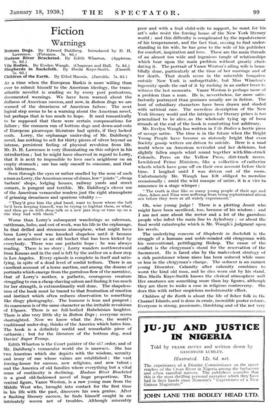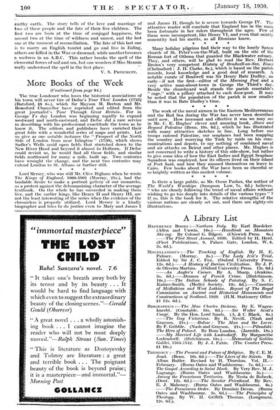Fiction
Warnings
Bottom Dogs. By Edward Dahlberg. Introduced by D. H. Lawrence. (Putnams. 7s. 6d.) Children of the Earth. By Ethel Mannin. (Jerrold& 7s. 6d.)
AT a time when the European Barkis is more -willing than ever to submit himself to the American ideology, the trans- atlantic novelist is sending us by every post portentous, documented warnings. We have been warned about the dullness of American success, and now, in Bottom Dogs we are warned of the dreariness of American failure. The next logical step seems to be a warning about the American novel, but perhaps that is too much to hope. It used romantically to be supposed that there were certain compensations for failure ; the common run of bottom dogs and down-and-outs of European picaresque literature had spirits, if they lacked souls. Lorry, the orphanage under-dog of Mr. Dahlberg's novel, has nothing to sell for thirty pieces of silver beyond an intense, persistent feeling of physical revulsion from life. Mr. D. H. Lawrence is very illuminating on this subject in his introduction ; but he might have observed in regard to Lorry, that it is next to impossible to love one's neighbour on an empty stomach ; one has only oneself to consume, and that with bitterness.
Seen through the eyes or rather smelled by the nose of such a man as Lorry, the American scene of slums, low'' joints ", cheap barbers' shops, lodging houses, railway yards and street corners, is pungent and terrible. Mr. Dahlberg's clever use of the American vernacular renders just the right atmosphere of grinning dreariness and spurious vitality :-
"They'd give him the glad hand, want to know where the hell he'd been keeping himself, was he trying to highhat them, or what, and then go on with shop talk or a new jazz step or tune up on a uke they had with them."
Worse than Lorry's subsequent wanderings as salesman, cattleman, hobo, and out of work, was his life in the orphanage. In that drilled and strenuous atmosphere, what might have been Lorry's soul was knocked shapeless until it became about as sensitive as an old bucket that has been kicked by everybody. There was one pathetic hope : he was always reading. There is no story ; Lorry wanders northwestward from Kansas and in the end is left by the author on a door step in Los Angeles. Every episode is complete in itself and satis- fying, in spite of a dead level of sordid tedium. There is an excellent account of a horse auction, and among the dozens of portraits which emerge from the garrulous flow of the narrative, that of Lorry's mother, a pathetic, courageous creature struggling to run a cheap shaving saloon and finding it too much for her strength, is extraordinarily well done. The shapeless- ness of the book must be traced to that frustration of emotion and instinct which often reduces observation to something like dingy photography. The humour is lean and pungent ; its coarseness is of the same character as the irritable revulsions of Ulysses. There is no full-bodied Rabelaisian laughter. There is also very little sky in Bottom Dogs ; everyone seems shortsighted. Now we know what the Jew, the world's traditional under-dog, thinks of the America which hates him. The book is a definitely sordid and remarkable piece of catharsis ; but for the literature of the bottom dog, read Davies' Super Tramp.
Edith Wharton is the Court painter of the old order, and of Mr. Dahlberg's vernacular world she is unaware. She has two Americas which she depicts with the wisdom, serenity and irony of one whose values are established ; the vast forcing-house for success, new religions, and new talent ; and the America of old families where everything but a vital sense of continuity is declining. Hudson River Bracketed is a good old-fashioned novel of huge proportions. The central figure, Vance Weston, is a raw young man from the Middle. West who, brought into contact for the first time in his life with the past, discovers his own genius. After a 'flashing literary success, he finds himself caught in an intricately woven net of troubles. Although miserably
poor and with a frail child-wife to support, he must for his art's sake resist the forcing house of the New York literary world ; and this difficulty is complicated by the inpulsiveness of his temperament, and the fact that, ceasing to find under- standing in his wife, he has gone to the wife of his publisher for comfort, inspiration and love. These are the main threads of an almost too wide and ingenious tangle of relationships which bear upon the main problem without greatly eluci- dating it. The portrait of Vance Weston's ailing wife is beau- tifully done, particularly at the time of her marriage and of her death. That death scene in the miserable bungalow outside New York is unforgettable, but Miss Wharton's ingenuity spoils the end of it by rushing in an earlier lover to witness the last moments. Vance Weston is perhaps more of a problem than a man. He is, nevertheless, far more satis- factorily portrayed than geniuses usually are in fiction. The host of subsidiary characters have been drawn and shaded with satirical care. The merciless description of the New York literary world and the intrigues for literary prizes is too generalized to be alive, as the wholesale tying up of loose strands at the end of the book is comforting but arbitrary.
Mr. Evelyn Waugh has written in Vile Bodies a hectic piece of savage satire. The time is in the future when the Bright Young People have become so riotously bright that even Society gossip writers are driven to suicide. Here is a mad world where an American revivalist and her delicious, but slightly fallen angels whirl round together with film-struck Colonels, Peers on the Yellow Press, dirt-track racers, bewildered Prime Ministers, like a collection of catherine wheels which have gone off on their own account before their time. I laughed until I was driven out of the room. Unfortunately Mr. Waugh has felt obliged to moralize occasionally ; amid the wild masque of satire, it is a vice to announce in a stage whisper : " The truth is that like so many young people of their age and class, Adam and Nina were suffering from -being sophisticated about sex before they were at all widely experienced."
Oh, wise young judge ! There is a plotting Jesuit who might have been sacrificed, too, because of his wisdom ; and I am not sure about the rector and a lot of the garrulous people who infest the main line to Aylesbury ; or about the final world catastrophe which is Mr. Waugh's judgment upon his revels.
The underlying concern of Shepherds in Sackcloth is the struggle of a humane and noble-minded old clergyman with his conventional, pettifogging Bishop. The cause of the conflict is the clergyman's stand for the reservation of the Sacrament. He is faced also by the malevolent strategy of a rich parishioner whose niece has been seduced while more or less in the clergyman's charge. The seducer is an earnest young Dissenter. Calamity after calamity combines to worst the kind old man, and he dies worn out by his stand. Miss Sheila Kaye-Smith knows the clerical atmosphere well Her creatures are something more than lay figures, although they are there to make a case in religious controversy. She does this with rather suspicious melodramatic effect.
Children of the Earth is about the life of fisher folk in tha Channel Islands, and is done in crude, incredible poster colours. Everyone is strong, passionate, throbbing and of the not very
earthy earth. The story tells of the love and marriage of. two of these people and the fate of their five children. The first two are born at the time of conjugal happiness, the second two at the time of wildness and unrest, and the last one at the moment of reconciliation. The fate of this last one is to marry an English tourist and go and live in Ealing, others are killed in the War or drowned, while another becomes a waitress in an A.B.C. This rather breaks the spell of the elemental forces of soil and sea, but one wonders if Miss Mannin teally understood the spell in the first place.
V. S. ParmaErr.







































 Previous page
Previous page